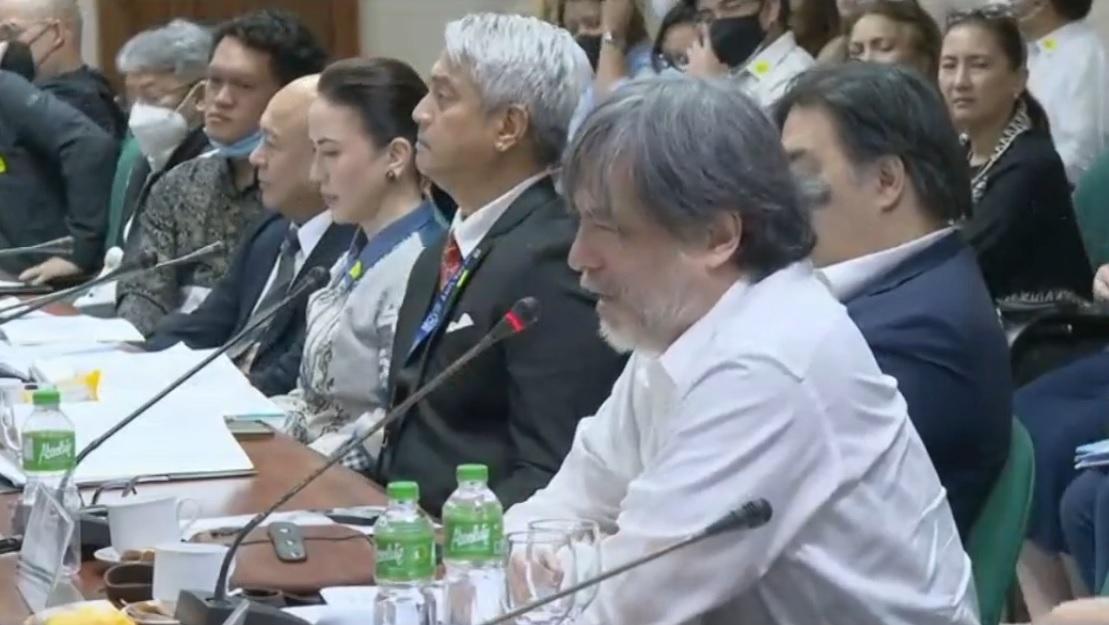Directors oppose proposed expansion of MTRCB’s mandate

Two renowned filmmakers on Thursday expressed their opposition to proposals expanding the mandate of the Movie and Television Review and Classification Board (MTRCB), saying this will suppress freedom of expression.
Directors Carlos Siguion-Reyna and Erik Matti made the stand at a Senate hearing on bills expanding the regulatory powers of MTRCB to online streaming platforms such as Netflix and HBO Go.
Siguion-Reyna argued that Presidential Decree 1986 provides MTRCB censorship powers, and that expanding its powers will further violate rights provided in the 1987 Constitution.
"Personally, ako, dapat buwagin na ang MTRCB because we should entrust into self-regulation...As I said before, in the other media, in the other outlets, walang MTRCB, walang prior restraining bodies. But just the same, we are not asking for the PD 1986 to be more liberal. Our position is to leave it as is at huwag nang i-enhance, i-amend or i-expand pa ang powers ng MTRCB because that is increasing the discrimination against these two industries," he said.
"If we are talking about Philippine values, I think one of our major values is freedom of expression and it's in the Constitution...na 1987 [ginawa] which postdates the 1985 law creating the MTRCB," he said.
Further, the director cited Article 19 of the United Nations Universal Declaration of Human Rights.
"Huwag na nating gawing mas garapal pa [ang batas] not only to filmmakers, not to expressors but to the general public because according to Article 19 of the United Nations Universal Declaration of Human Rights, freedom of expression does not only mean freedom of expression nung gumagawa, ng communicator. It also means freedom to receive info from the audience's point of view," he said.
Matti shared the same position, saying the terms of the MTRCB are already "dated."
"Ako sa totoo lang kung papunta na tayo sa self-regulation, hindi naman talaga kailangan ng MTRCB but since nandito na tayo, siyempre mawawalan din sila ng trabaho. Hinahanapan natin ng paraan na ang pinakamagandang trabaho na pwedeng mabigay ng MTRCB na hindi naman makakapag-violate ng either freedom of expression or 'yung rights ng mga artists na gumagawa ng films," Matti said.
Matti pointed to South Korea's lifting of censorship rules, which he said helped their film industry thrive.
"If we allow people to responsibly express their art, makikita natin 'yung iba't-ibang ideas na pwedeng hindi makita ng ibang mga tao at yung artist ang pwedeng makapagpakita nuon," Matti said.
"Kung hindi angkop sa ibang grupo ng tao, pwede namang hindi nila tangkilikin ang bagay na 'yon," he added.
This point was opposed by MTRCB Chairperson Diorella Maria Sotto-Antonio, saying Korea also has their own media ratings board.
She said the MTRCB should be empowered to ensure that the Filipino families will have a safe viewing experience.
"Being too liberated is not a good idea, being too conservative is not a good idea as well. They will be both dangerous," she said.
"That's why the MTRCB should be here to strike a balance and it's also part of our core mandate to protect the children from anything that may cause disturbance to their mind," she added.
She also expressed opposition to the idea of abolishing MTRCB.
"I do not believe that the solution is to abolish. The solution is to empower the agency. As chairman of the MTRCB, we will continue to uphold its mandate and that is to give every Filipino family a safe viewing experience," she said.
Siguion-Reyna clarified that they are not pushing for the abolition of the agency, but opposing the expansion of MTRCB's powers because "it is very unconstitutional as it is."
Meanwhile, Senator Ramon "Bong" Revilla Jr. said there must be a clear definition of self-regulation.
"'Di naman po siguro lahat ng freedom ay absolute. Siguro dapat tinitingnan din natin kung talagang lumalagpas na sa limitasyon...I-define natin ang self-regulation dahil hindi natin mai-screen nang ganoon kabilis, at ganoon kabilis aaksyon ang MTRCB o kasama ang NTC para halimbawa ito'y obscene na ang ginagawa," Revilla said.
Siguion-Reyna said self-regulation means the movie and television industry would also have their own flagging system. This, he said, is something that they can do without help from the state.
Currently, Senior State Solicitor Lilian Abenojar said there is no existing jurisprudence that provides the definition of self-regulation as the Supreme Court puts a premium to freedom of speech subject to certain limitations.
"Self-regulation, for me, essentially, it means an entity is going to took upon [itself] to regulate [itself] based on standards na tingin niya na dapat niyang sundin to protect the public," Abenojar said.
Abenojar cited as an example MTRCB's partnership with Netflix where, she said, the online streaming recognizes the standards of MTRCB and is willing to consider these.
"With respect sa freedom of speech, right now, we have three tests para po hindi maging prior restraint yung actions ng government: dangerous tendency doctrine, balancing of interest test, and the clear and present danger rule," she said.
Abenojar said the MTRCB should be empowered for the benefit of the general public.
"I think the MTRCB, based on its present powers and based on the proposed amendments, should be empowered to regulate. I think that the MTRCB is very much aware that they will not borderline on censorship with respect po doon sa pag-exercise ng powers, but I think, the greater public interest requires a regulatory body still with respect to these media forms," she said. — BM, GMA Integrated News




